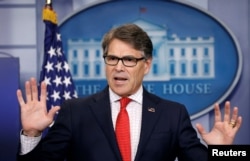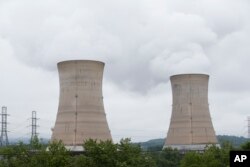A U.S. Energy Department report calls for incentives to boost coal-fired and nuclear power plants following a slew of closures that it said undermined reliable sources of electricity.
The findings of the study, released late Wednesday, drew praise from the coal and nuclear industries and a mixed reaction from renewable energy groups — some of which said the report's recommendations could help them, too.
President Donald Trump has promised to revive the ailing coal mining sector but has also said he welcomes all forms of energy development to shore up domestic production.
Energy Secretary Rick Perry commissioned the grid study in April to evaluate whether "regulatory burdens" imposed by past administrations, including that of former President Barack Obama, had hurt the grid by forcing shutdowns of baseload plants, which provide nonstop power, like those fired by coal and nuclear fuel.
Obama introduced regulations intended to slash emissions of carbon dioxide, which are blamed for climate change. This accelerated the retirement of coal-fired power plants and bolstered the nascent solar and wind sectors, which depend heavily on weather conditions for their power output.
"It is apparent that in today's competitive markets certain regulations and subsidies are having a large impact on the functioning of markets, and thereby challenging our power generation mix," Perry said in a letter introducing the study. "It is important for policy makers to consider their intended and unintended effects."
The study, conducted by the department's staff, said cheap natural gas was the main driver of the closure of baseload coal and nuclear plants, a trend that was putting areas of the country at greater risk of power outages.
The department recommended giving baseload plants pricing advantages for their power, as well as making it easier and cheaper to get permits to build more such projects.
Mixed reaction
The report differed from an earlier draft, which had said big increases in renewable power generation remained possible without undermining grid reliability, and which did not propose added support for baseload producers.
The administration had not yet reviewed the earlier draft, which was written by department staff.
Some coal and nuclear energy groups welcomed the final report's findings.
"This is a much-needed, pragmatic look at U.S. electricity reliability and resilience, including the priority of maintaining critical clean baseload power as electricity markets change," said Rich Powell, director of ClearPath, which advocates for nuclear and hydropower.
Renewable fuels supporters had a wide range of reactions.
The Center for Biological Diversity called the report's recommendations "dangerously misguided," and the Sierra Club also bashed the study.
But America's biggest solar and wind power associations said they felt the study contained elements that were positive such as not singling out renewable energy as a big problem.
"The report did not ... lay the demise of coal at the feet of renewable energy, and that is an important finding," Abigail Ross Hopper, president of the Solar Energy Industries Association, wrote in an email to the trade group's members on Thursday.
SEIA and other groups, including the American Wind Energy Association, said wind and solar could benefit from some of the report's recommendations, such as a call for infrastructure development and market reforms.
AWEA said in a blog post that technological advances could allow wind energy to provide reliability services, such as fast ramping to regulate the grid's frequency signal.







